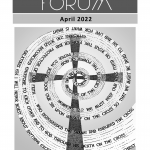webdev
Thought for the Week – 17th April 2022
Blossom
This is inspired by a reflection by the Rev Malcolm Guite, published recently in the Church Times.
The blossom is starting to appear both on hedges and trees. In my garden I have a damson tree, which is now white; fortunately it has so far escaped the April frosts. Once it has gone, it will be followed by the pinks and whites of the apple and pear tree blossoms. We live in a region of renowned for fruit growing; Longmore House in Billingsley takes its name from a pear tree orchard, in the 19th century, Highley was noted for its cider orchards and the countryside around Bewdley has numerous cherry and plum orchards. All of this makes for a colourful spring. There is something quite uplifting about early spring; how trees that have been cold and apparently lifeless over the winter come back to life, promising renewed life and raising our own spirits as we anticipate the finer weather to come. I paraphrase the words of the Rev Guite; “as I thought of new life coming from the old blossom trees, I pondered again how at Easter 2000 years ago, life sprang from a tree cut into a cross, on a hill overlooking Jerusalem”.
Rev David Poyner
Thought for the Week – 10th April 2022
Cooking Beans
A colleague at work this week posted on his Facebook page what I believe is a classic Chinese poem, first published in 430AD and called Quatrain of Seven Steps, apparently because it could be recited whilst walking just seven paces. Wikipedia has the full story. The author imagines beans, being boiled over a fire, calling out to the bean roots, which are being burnt to make the heat.
Beans are boiled to make broth, Pulses are filtered to extract juice.
Under the pot the beanstalks burn, In the pot the beans weep.
“We are born of the self-same root, Why in such a rush to cook me?”
The poem is said to have been written in response to the threat of civil war and is essentially an appeal for the ruler of the victorious party to be merciful in his treatment to the losers; the poet is reminding him of his common humanity with the vanquished. The confirmation of killings of civilians in Ukraine by Russian forces shows us what happens when individuals forget this and see only enemies, not fellow humans made in the image of God.
Rev David Poyner
Thought for the Week – 3rd April 2022
The Slap at the Oscars
On Monday this week, I switched on Radio 4 at 7am for the news and found it dominated by the story from the Oscars; actor Will Smith hitting compere Chris Rock after Rock made a joke about Smith’s wife. Now film and TV would not be my specialist subject on Mastermind and whilst even I have heard of Will Smith, I had no idea who Chris Rock was. But the story has continued to roll, even on Radio 4.
From what I have subsequently discovered, it appears Messrs Smith and Rock have previous form; once friends, they fell out some years ago. As far as I can tell, the general reaction has been to condemn Smith’s violence, whilst perhaps having some sympathy for his anger. There seems some sadness that the ceremony will not be remembered for Smith’s Oscar, but for his temper; perhaps a man trapped by past events.
My own reflections on this story lead to the story of another slap; that given to the face Jesus by those who judged him before the court of the High Priest, after his arrest in the Garden of Gethsemane. But Jesus, who famously taught that his disciples should literally turn the other cheek in response to an attack, made no show of anger and raised no voice of protest. He simply absorbed the insults and violence and, from the cross, forgave. Perhaps the parties to the Oscar slap may also learn how forgiveness can free them from the past.
Rev David Poyner
Highley Forum – April 2022
Thought for the Week – 27th March 2022
Mothering Sunday
This Sunday (27th) is Mothering Sunday; “Mother’s day” as greeting card makers usually put it. Whatever we call it, it is usually a time when we remember mothers, especially our own. This is good, especially if it is done remembering that the relationship between mother and child may have been difficult for some. But there is another aspect that is often neglected. Before Mothering Sunday ever became a celebration of mothers, it was a time when people remembered the place they came from and in particular the parish church they attended. This was their “mother church”, and, at its best, it was the place where small communities would come together; the people who attended that would be part of the wider, extended family to all the children growing up together. So Mothering Sunday was a recognition that individuals were part of something more than immediate family. Now the parish church has largely lost that role, but there is an important truth that still holds; we are more than individuals; we have connections with each other. As refugees pour out of Ukraine, from Syria and the Middle East, as our food banks creek under the strain and the cost of living rockets, we need to remember we are not just related to our immediate family.
Rev David Poyner

